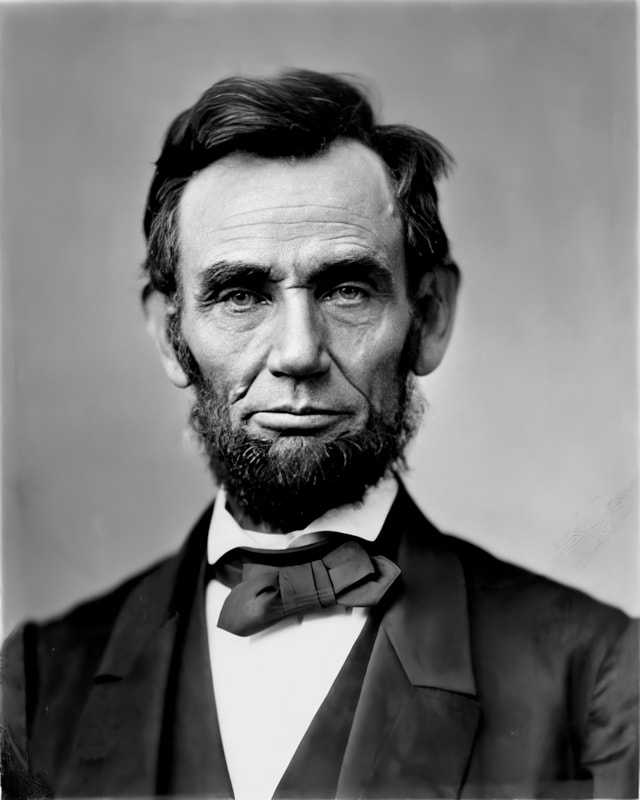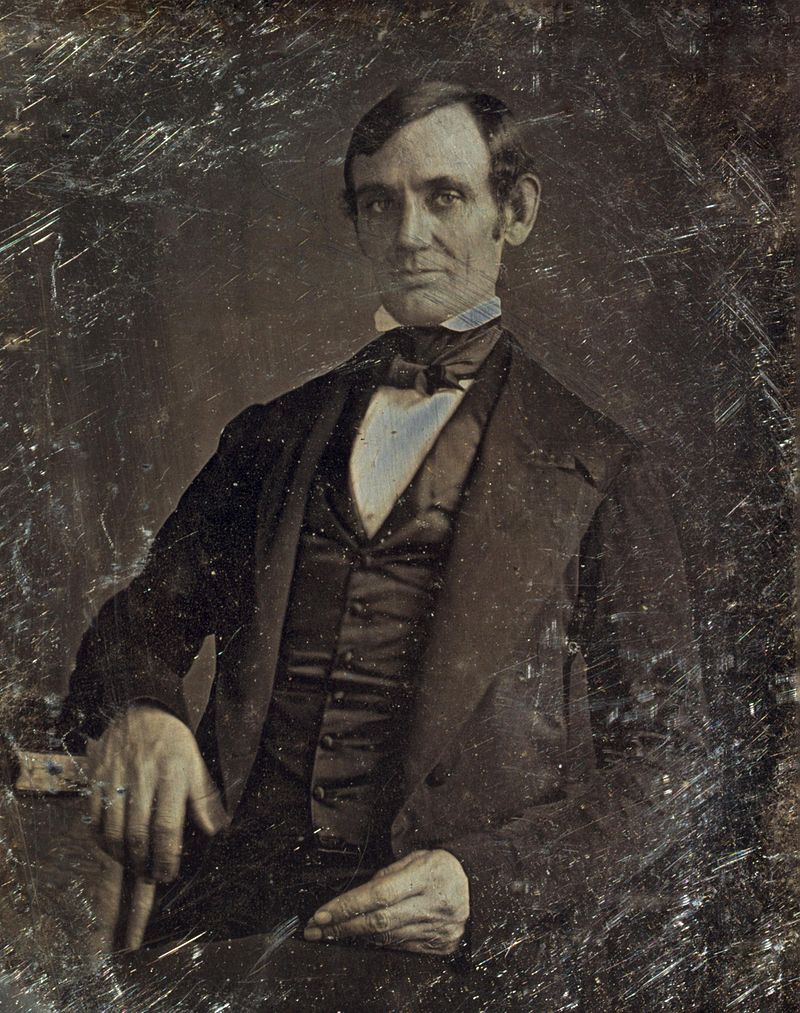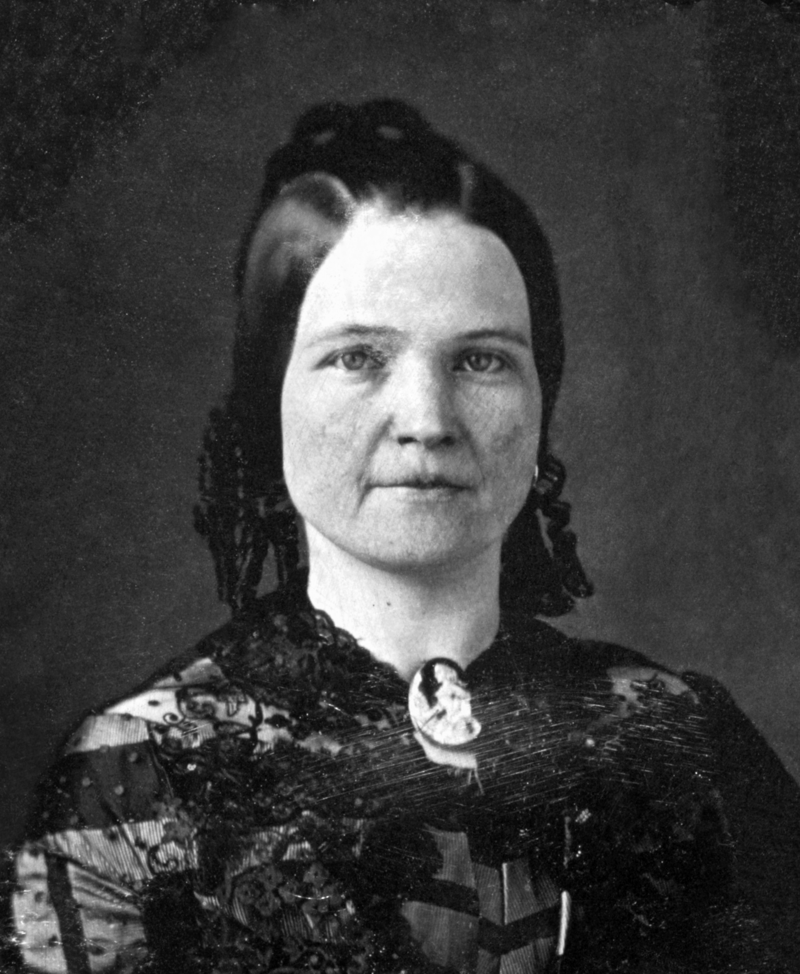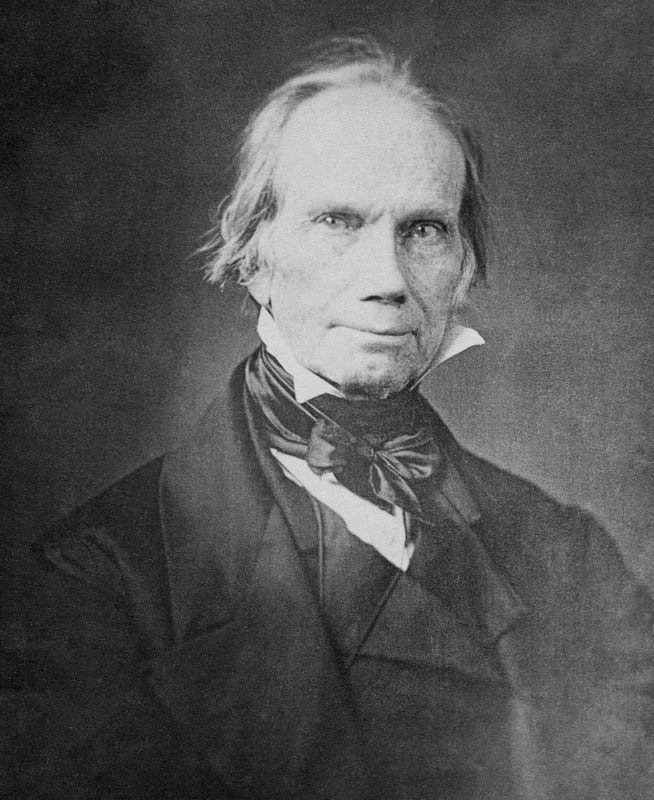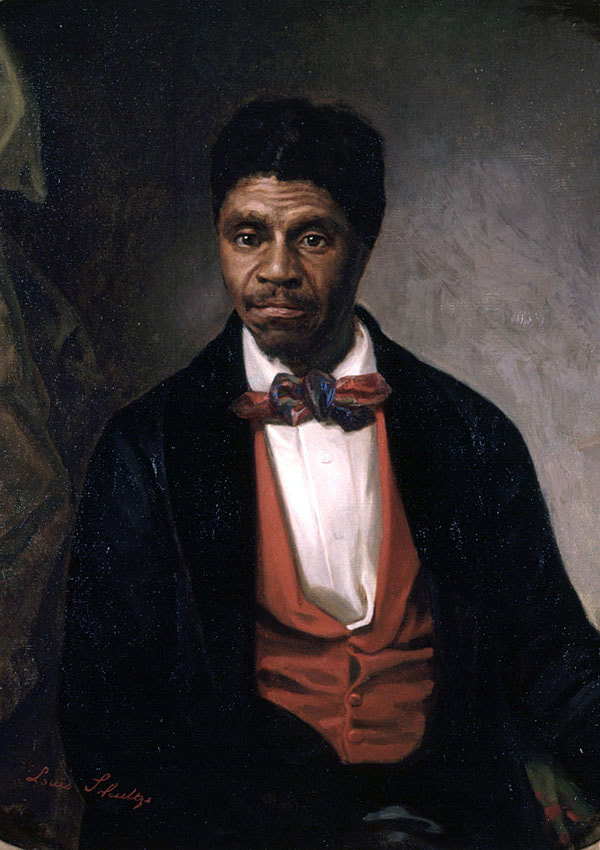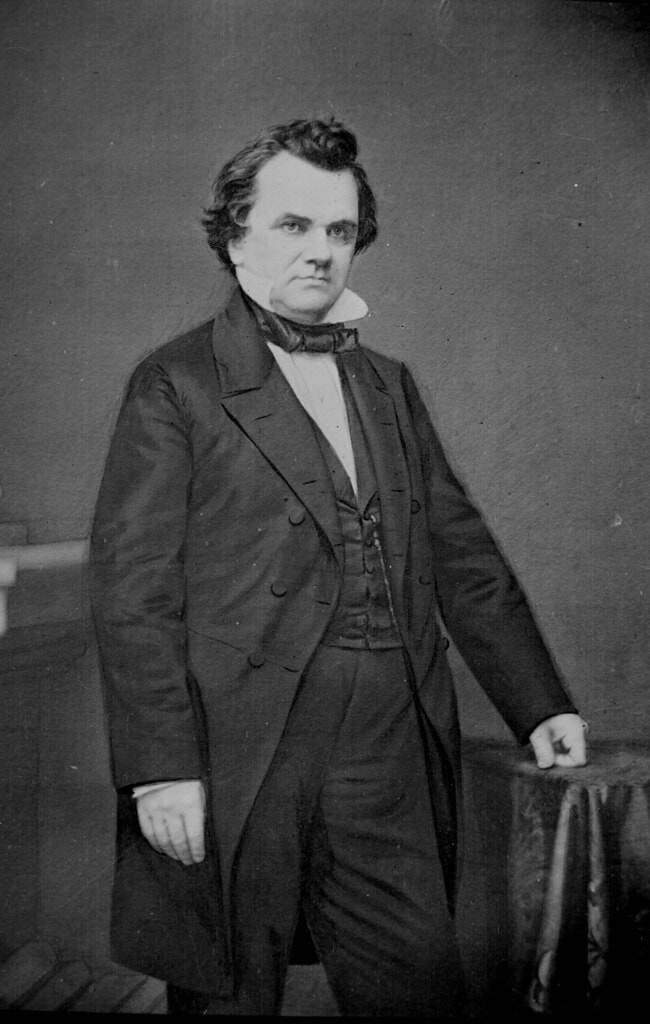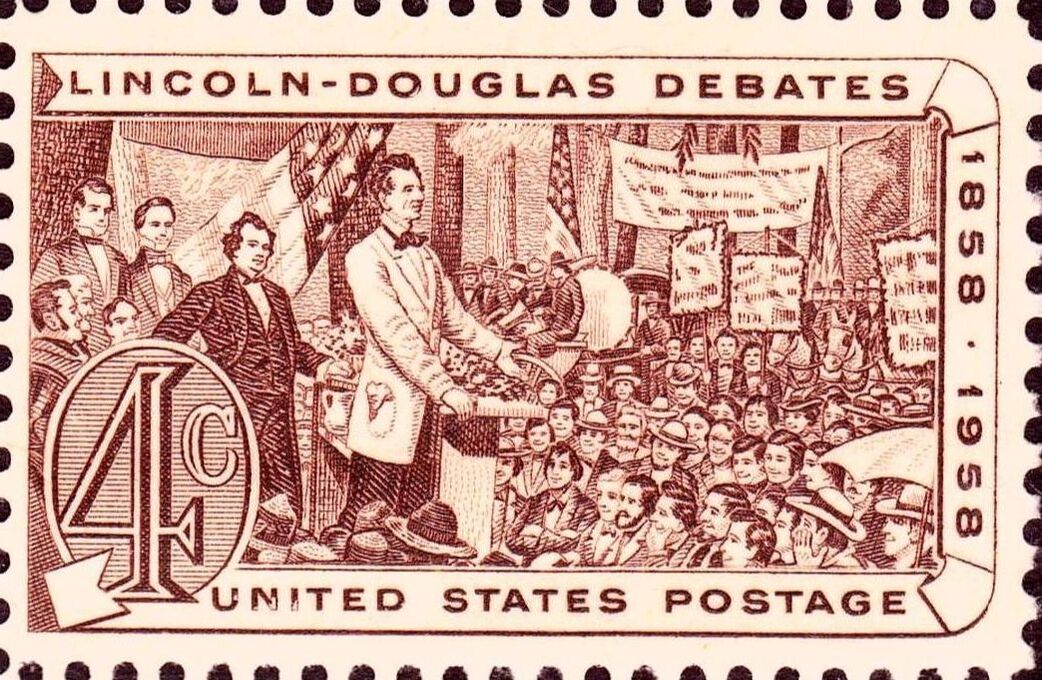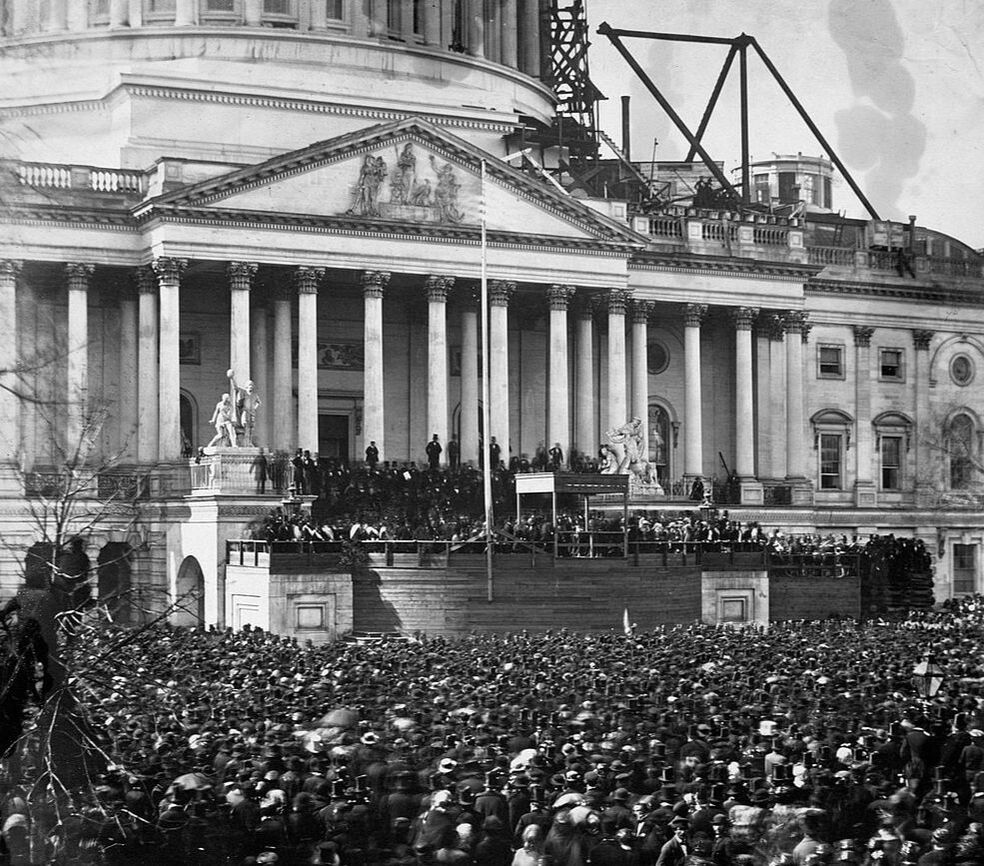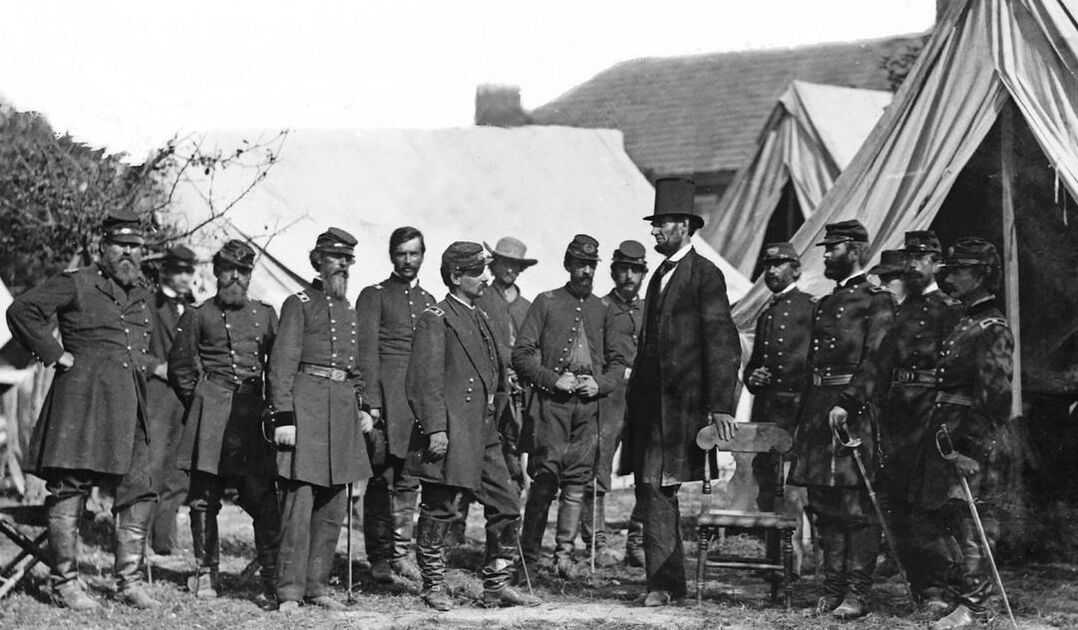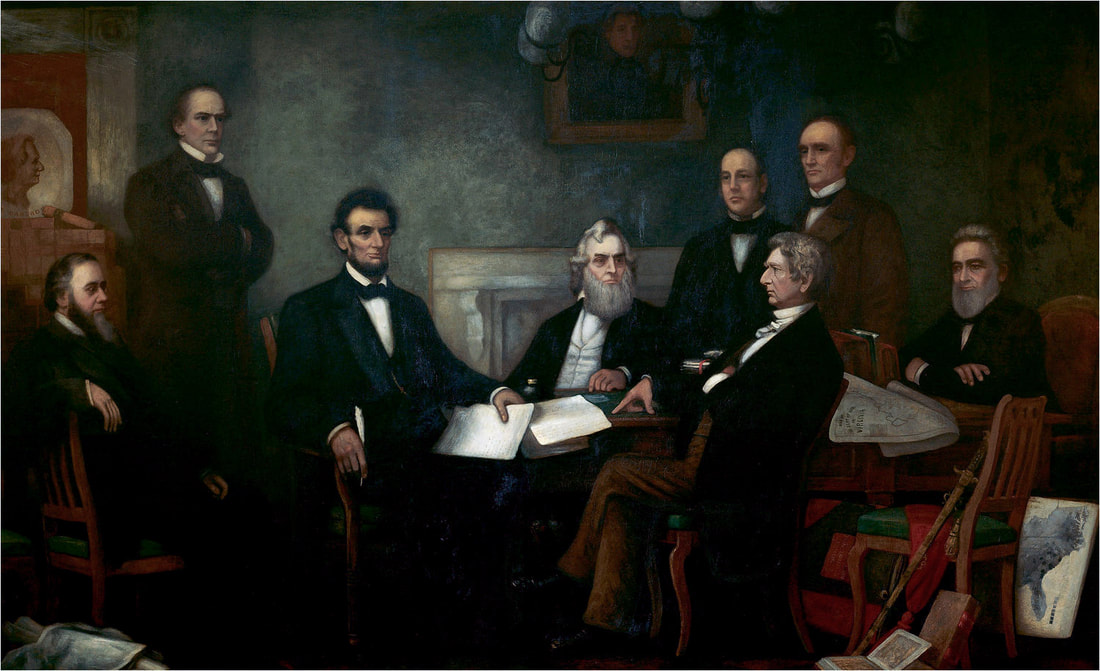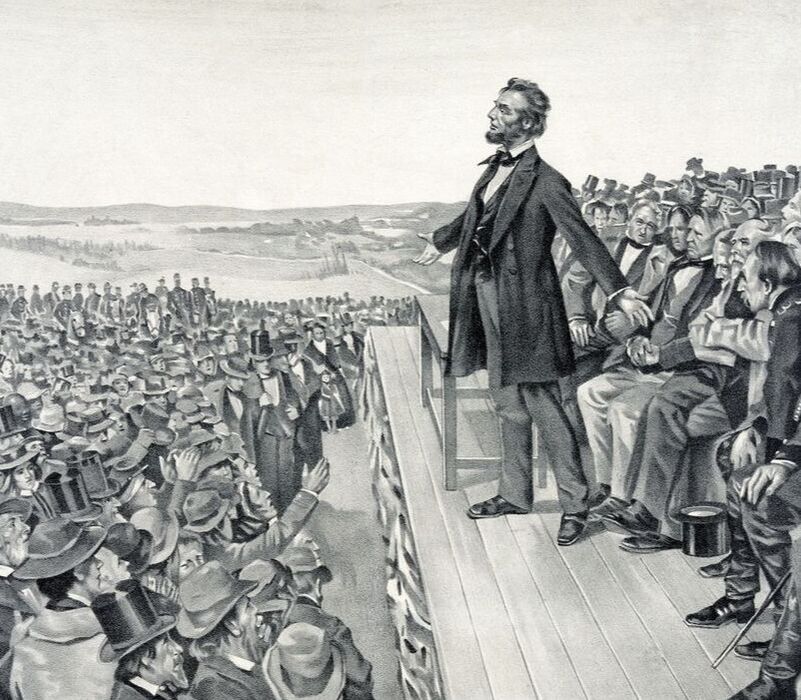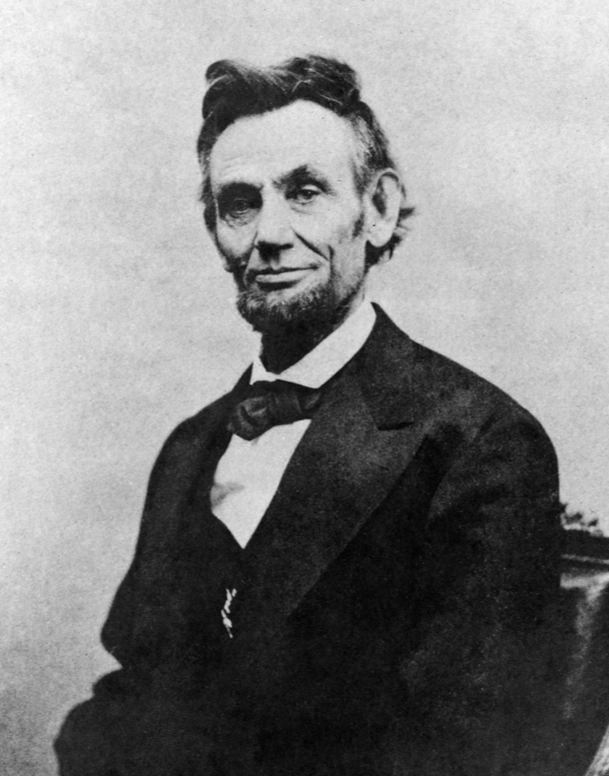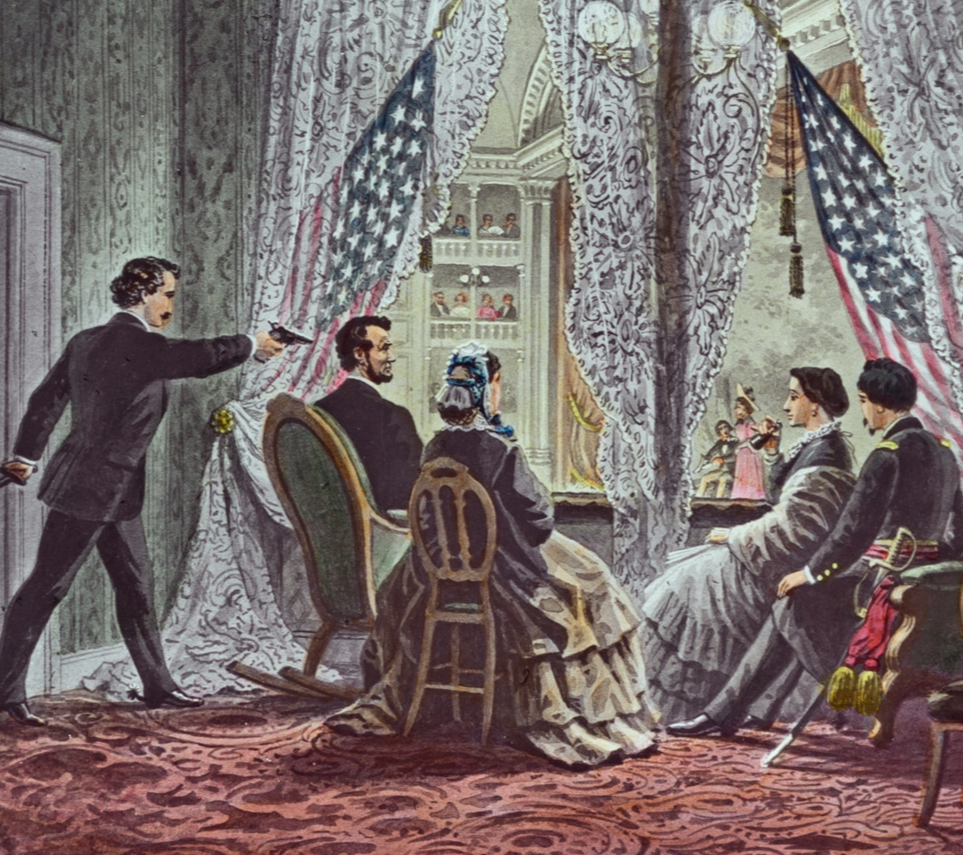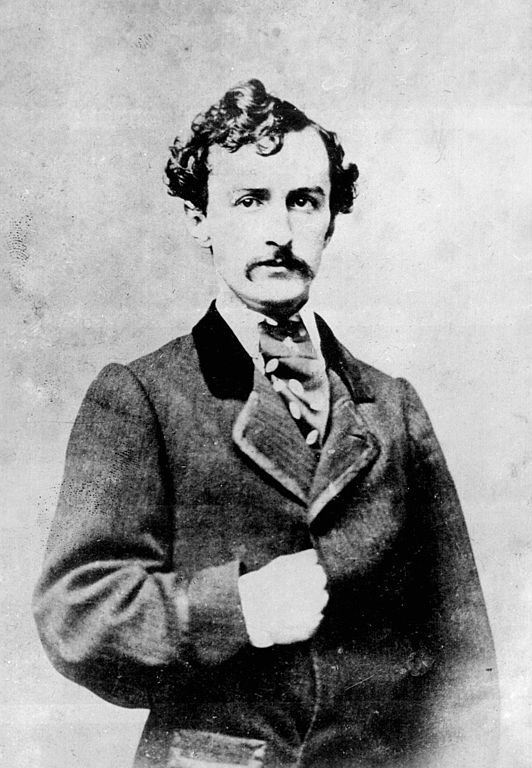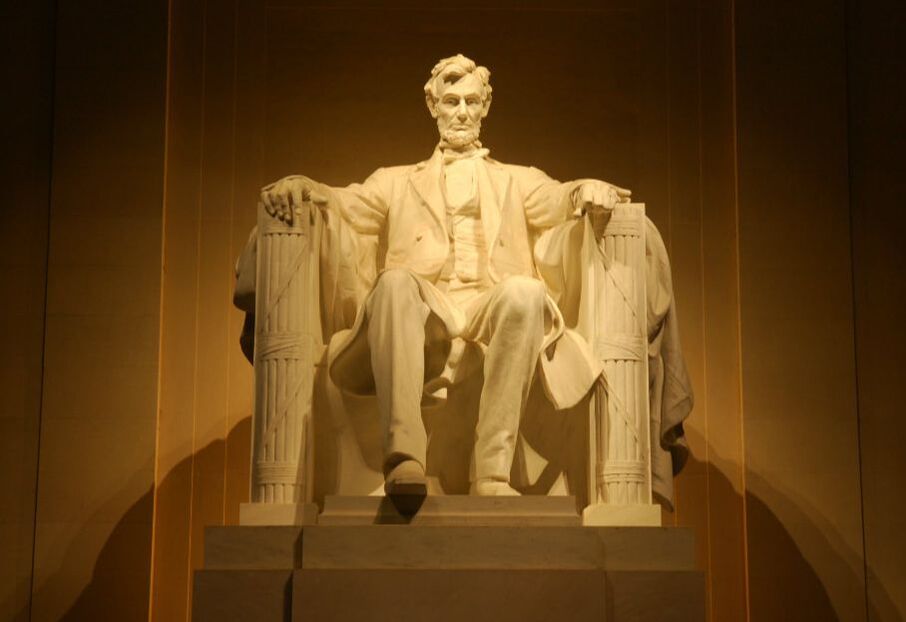ABRAHAM LINCOLN
Abraham Lincoln is one of the most significant people in all of American history. He was the 16th President of the United States and served in office from March 4th, 1861 until April 15th, 1865. As President, Abraham Lincoln led the country through some of its most conflicted moments. For instance, he was President during the American Civil War, which saw the Northern states (Union) face off against the Southern states (Confederacy) in a series of bloody battles. As well, he dealt with the issue of slavery in the United States and eventually led the United States towards abolishing its practise. Lincoln’s presidency ended when he was assassinated by John Wilkes Booth on April 15th, 1865.
ABRAHAM LINCOLN'S EARLY LIFE
|
Abraham Lincoln was born on February 12th, 1809 in Kentucky. In fact, the site of his birth and childhood, Sinking Spring Farm, is a today a National Historic Park. Abraham was the second of three children born to Thomas Lincoln and Nancy Hanks Lincoln. Abraham Lincoln’s early life was rather humble in that his family did not have much and moved several times seeking new opportunities. For instance, in 1918, Abraham Lincoln’s family left Kentucky and moved around the modern Midwest, spending most of his childhood in Indiana before eventually winding up in Illinois. During this time, Thomas Lincoln held several different jobs, including as carpenter and cabinetmaker. However, his primary work was as a farmer.
As a child, Abraham Lincoln received little in the way of formal education, however he was known to be a strong reader and enjoyed literature. He worked on the family farm and did other jobs to help raise money for the family. However, in 1831, left the family farm and moved to New Salem, Illinois. While there he worked at several different professions. For instance, at first, he and a partner purchased a general store. It wasn’t successful and soon after he also worked as a postmaster and county surveyor before eventually getting involved with politics.
|
ABRAHAM LINCOLN ENTERS POLITICS
At first, he participated in elections local to New Salem. While it helped him gain recognition among the people, he failed to win any elected seats throughout the early 1830s. Regardless, he continued to read and began to study law as a means of improving his education for a career in politics. His hard work paid off and in 1834, Lincoln was elected to the Illinois State Legislature as a member of the Whig Party.
During his time in the Illinois State Legislature, Lincoln fought for several causes, but he also began to show his dislike for the practise of slavery. However, he also continued to study during this time and eventually passed the Illinois bar in 1836, after which he began practising as a lawyer in Springfield, Illinois. He proved to be a strong lawyer and excelled at debating, which proved to be an important aspect of his personality later in life. In 1839, he met Mary Todd, and the two began a relationship with each other. They married just three years later, on November 4th of 1842. Together, the couple eventually had four sons. His political pursuits were not over, as in the 1846, Lincoln was elected as a Whig to the United States House of Representatives for Illinois. This was a significant step in Lincoln’s career because it was a pivotal move towards him eventually becoming the United States President.
Ultimately, Lincoln only served one term in the House of Representatives. During that time, he introduced legislation towards abolishing slavery in the District of Columbia and voiced his disapproval of the Mexican-American War. Neither of these views were popular though and did not help increase Lincoln’s political appeal. As such, after the end of his first term in 1849, Lincoln left office and returned to his law office in Springfield. Over the next decade, he represented clients in hundreds of cases. His skill as a lawyer during this time gained him a reputation and the nickname ‘Honest Abe’. Regardless, Lincoln returned to politics in the 1850s and emerged as a leader for the Republican Party.
ABRAHAM LINCOLN THE REPUBLICAN
Throughout the 1850s, the topic of slavery became a major issue that divided the United States. For instance, the Compromise of 1850 dealt with a growing divide between the Northern states and Southern states especially in relation to slavery and state’s rights. It was an imperfect solution and led to other crises, including the Kansas-Nebraska Act and Bleeding Kansas. This is important, because Abraham Lincoln’s rise to political prominence occurred with the backdrop of division in the United States over slavery.
In earlier elections, Lincoln had run as a member of the Whig Party and was heavily influenced by Henry Clay. However, Clay died in 1852 and the Whig Party essentially collapsed as a political force in the mid-1850s. As a result, Lincoln sought to join the Republican Party, which had just formed in 1854. The Republican Party was mainly represented in the Northern states and gained much of its membership from the former Whig Party. Politically, the Republican Party was anti-slavery and sought to face off against the Democratic Party, which was more popular in the Southern ‘slave’ states.
Lincoln joined the Republican Party in 1856 and quickly gained recognition within the party for his speaking abilities. Although the Republicans lost the 1856 election and Democrat James Buchanan became the 15th President of the United States, Lincoln had risen his political stature throughout the state of Illinois and the Republican Party. He furthered this by offering anti-slavery views, which were popular among those in the Northern states. For instance, Lincoln spoke out against the 1857 Dred Scott Decision. Dred Scott was an African-American man that had been born into slavery sometime and best remembered today for the famous court case in which he challenged his status as a slave and fought to gain his freedom and the freedom of his family members. The court cause (referred to as the ‘Dred Scott Case’ or ‘Dred v. Sandford’) occurred in 1857 and was an important moment in American History. Dred Scott ultimately lost his case when the Supreme Court ruled against him. This angered many in the Northern states, along with Lincoln, as they felt it would protect slavery. Lincoln’s stance on issues such as the Kansas-Nebraska Act and the Dred Scott Case set the state for his famous debates against Stephen Douglas for the United States Senate.
LINCOLN-DOUGLAS DEBATES
Abraham Lincoln’s seven debates against Stephen Douglas for the 1858 election for the United States Senate were a key element of his eventual election as the 16th President of the United States. Stephen Douglas was a lawyer from Illinois and had served as a United States Senator for Illinois since 1847. Douglas was up for re-election in 1858 as a Democrat and was challenged by Lincoln who was running for the Republican Party. During the campaign for the Senate seat, the two politicians agreed to a series of seven debates that spanned across the districts of Illinois. Each debate was 3 hours long and focused on a single topic, which allowed the two candidates to argue in depth on particular issues. Of course, the main issue facing the country at the time was slavery and its practise in the United States.
The seven Lincoln-Douglas debates were major events at the time and thousands of people came out to hear the two men debate. In fact, although the election was for a United States Senate seat in Illinois, many people came from the neighbouring states because the topics they discussed were relevant to the divided nature of the country at the time. Ultimately, Douglas won the election and was re-elected to the Senate. Regardless of the loss, the debates helped to gain Lincoln a broader base of support within the Republican Party and prepared him for the 1860 Presidential election. Beyond this, the Lincoln-Douglas debates have become known as some of the most significant political debates in all American history. The debates were highly structured and led to a deep discussion of important issues that were impacting the country in the years before the outbreak of the American Civil War, which began just a few years later in 1861.
ABRAHAM LINCOLN'S PRESIDENTIAL ELECTION OF 1860
Abraham Lincoln gained the Republican nomination for President on May 18th of 1860 at the Republican National Convention, which was held in Chicago, Illinois. Hannibal Hamlin of Maine was chosen to be Lincoln’s Vice President candidate. During the campaign for the 1860 Presidential election, Lincoln faced off against three other candidates. The Democratic Party of the Northern states nominated Stephen Douglas, which Lincoln had faced off against in 1858 for the Illinois Senate seat. The Democratic Party of the Southern states nominated John C. Breckinridge. At the time, the Democratic Party was facing a crisis in that the Southern states did not agree with Stephen Douglas’ stance on slavery. As such, in 1860 the Democratic Party nominated two candidates for president. Finally, a third party called the Constitutional Union Party, nominated John Bell.
Throughout the lead up to the 1860 election, Lincoln did little actual campaigning. Instead, the Republican Party organized the campaign efforts and particularly focused on young voters. As well, the campaign team for Lincoln gained support for Lincoln by producing many campaign posters and pamphlets. Ultimately, the hard work paid off and Lincoln was elected the 16th President of the United States on November 6th in 1860.
He was the first Republican President in United States history and received over 1.8 million votes which represented 39.8% of the total. Although this was a strong victory for Lincoln, the 1860 election highlighted the divided nature of the United States at the time. For example, Lincoln received almost no support from the Southern states. In fact, there was not a single ballot cast for Lincoln in 10 out the 15 Southern states. As such, many historians point to Lincoln’s election as a significant factor in the eventual outbreak of the American Civil War in 1861.
Abraham Lincoln is often referred to as one of the greatest presidents in the history of the United States. This is remarkable, considering that much of his time as President was marked by the events of the American Civil War and a divided nation. Following his November 6th, election victory, Abraham Lincoln was set to take office in March of 1861. Almost immediately, the Southern states began to express anger over Lincoln’s election and began to talk of secession. This means that the Southern states were seeking to leave the Union and break off from the Northern states. In fact, before Lincoln was inaugurated the following states seceded and formed the Confederate States of America: Alabama, Florida, Georgia, Louisiana, Mississippi, South Carolina and Texas. Therefore, many historians argue that the election of Abraham Lincoln was a major cause of the Civil War, as it enflamed the already tense divide that existed in the nation.
ABRAHAM LINCOLN & THE AMERICAN CIVIL WAR
The American Civil War is one of the most significant events in the entire history of the United States. It occurred from 1861 until 1865 and saw the Northern states (Union) engage in a series of bloody battles with the Southern states (Confederacy). The first battle of the Civil War, and the one that historians consider to be the event that sparked the Civil War, was the Battle of Fort Sumter. Fort Sumter was a sea fort located in South Carolina. This is significant because South Carolina was the first Southern state to secede from the Union, following the election of Abraham Lincoln. The conflict at Fort Sumter began on April 12th in 1861 when Lincoln sent supplies to the fort, which was held by Union forces. The Confederacy was angered by this action, as they viewed it as going against their authority over the South and declared war against the Union. In fact, the Southern states demanded the surrender of forts throughout the South and the removal of the United States Army from the region. At Fort Sumter, the Confederate forces battered the fort with artillery strikes beginning on the morning of April 12th. While, the Union forces inside the fort tried to fight back, they were severely outmatched and were forced to surrender the fort just a day later on April 13th.
On April 15th, Lincoln made a call for other states to assemble 75,000 forces to recapture and fortify Fort Sumter. This sparked further anger throughout the Confederacy and escalated the tensions at the time. In fact, because of Lincoln’s call, four more states ceded and joined the Confederacy, including: Arkansas, North Carolina, Tennessee, and Virginia. Therefore, this shows the significance of the Battle of Fort Sumter as a cause of the American Civil War. In fact, some historians have argued that Lincoln misunderstood Southern anger at the time and mismanaged his response to the conflict at Fort Sumter. Regardless, the Civil War had begun, and the overall path and outcome of the Civil War was incredibly important to the later years of Abraham Lincoln and his presidency.
Lincoln played an incredibly significant role throughout the history of the Civil War. For instance, as President of the United States, Lincoln played an important part in the Union’s military response, including appointing generals and discussing military strategy. His main motive at the time was to reunify the country and end the rebellion of the Confederacy as quick as possible.
|
The Civil War unfolded as a series of major battles, including major conflicts, such as: Battle of Antietam, First Battle of Bull Run, Second Battle of Bull Run, Battle of Gettysburg, Battle of Shiloh and the Battle of Cold Harbor.
Throughout the war, Lincoln responded by putting the military officials in charge that he thought could bring about the quickest victory. Significant Union leaders of the time included: George McClellan, Joseph Hooker, William Rosecrans, John Pope, George Meade, Ambrose Burnside, and Ulysses S. Grant.
|
The next major contribution of Abraham Lincoln during the Civil War was the Emancipation Proclamation. The Emancipation Proclamation is one of the most significant events in American history from the time of the 19th century. It was a presidential proclamation from Abraham Lincoln that legally freed millions of slaves living in the Southern Confederate states. As such, it was important to the history of slavery in the United States and the American Civil War. In fact, the Emancipation Proclamation took effect on January 1st of 1863, in the midst of the Civil War.
Another significant event in 1863 was the Gettysburg Address. It was a speech that Abraham Lincoln gave on November 19th, which was about four months after the end of the Battle of Gettysburg. The battle ended with a victory for the Union and eventually helped lead the way for a Union victory in the overall Civil War. The Gettysburg Address was a dedication ceremony for a soldier’s cemetery in Gettysburg, Pennsylvania. Lincoln’s speech there has since become one of the most famous Presidential speeches in American history. In the famous speech, Lincoln expressed the idea that the Battle of Gettysburg was a significant event in protecting the unity of the nation. He makes links to the Declaration of Independence and discussed the idea of American freedom being at the center of the Union’s actions in the Civil War.
Ulysses S. Grant’s contributions to the Civil War throughout 1863 and 1864 were incredibly significant. At the time, Grant was a Union General in charge of major military operations in the Battle of Shiloh and Vicksburg Campaign. Both of these were major victories for then Union and helped Lincoln to appoint Grant as a major military force in the final years of the Civil War. In fact, Lincoln approved of Grant’s ‘Overland Campaign’ throughout 1864. The campaign saw Grant lead Union forces slowly south into Confederate territory. It was a bloody campaign that saw many lost lives for both the Union and Confederacy, but ultimately resulted in the end of the war. For example, throughout late 1864, the Confederacy began to seek an end to the war and sought negotiations with Lincoln and the Union. Lincoln refused as he did not view the Confederacy as equal to the Union. Regardless, the Civil War ended on April 9th in 1865 when Confederate General Robert E. Lee surrendered his forces to Ulysses S. Grant at Appomattox, Virginia.
ABRAHAM LINCOLN'S LATER YEARS
|
Before the end of the Civil War in 1865, Abraham Lincoln ran for re-election as President of the United States in 1864. It was not certain that he would win, as many as the time were angered with the ongoing issues of the Civil War. Regardless, he was re-elected and even gained further support than his 1861 election. On March 4th in 1865, Lincoln gave his second inaugural address, in which he argued that the Civil War was ‘God’s Will’ and called for reunification of the nation. For instance, he stated the following, which is also inscribed on the Lincoln Memorial in Washington D.C.:
“Fondly do we hope—fervently do we pray—that this mighty scourge of war may speedily pass away. Yet, if God wills that it continue, until all the wealth piled by the bond-man's 250 years of unrequited toil shall be sunk, and until every drop of blood drawn with the lash, shall be paid by another drawn with the sword, as was said 3,000 years ago, so still it must be said, "the judgments of the Lord, are true and righteous altogether". With malice toward none; with charity for all; with firmness in the right, as God gives us to see the right, let us strive on to finish the work we are in; to bind up the nation's wounds; to care for him who shall have borne the battle, and for his widow, and his orphan—to do all which may achieve and cherish a just and lasting peace, among ourselves, and with all nations.”
|
As the Civil War came to an end, and it became clear that that Confederacy could not maintain its war effort, Lincoln and his government began preparing for ‘Reconstruction’. In short, Reconstruction refers to the time period in American history from 1865 until 1877, in which the country recovered and reunified following the division of the Civil War. Lincoln knew it was necessary to bring the Confederate states back into the Union once the war was over and sought to do so in a way that would preserve the United States. While, Lincoln was responsible for starting the process of Reconstruction in American history, he was not able to see it through because he was assassinated in 1865.
ABRAHAM LINCOLN'S ASSASSINATION
Abraham Lincoln was assassinated on the evening of April 14th in 1865, just over a month following his second inaugural address. He was assassinated by John Wilkes Booth, who was a relatively well-known actor of the day. At the time, Lincoln was attending a play called ‘Our American Cousin’ at Ford’s Theatre in Washington D.C. Booth approached Lincoln while he was watching the play in his theatre box and shot the president in the head. He shot the president with a ‘Philadelphia Derringer’, which was a small styled handgun. Booth stabbed another person in the box and ran from the theatre in order to make his escape. Lincoln did not die right away from the gunshot, and remained alive, although in a coma, until early the next morning. As such, Lincoln’s death is officially dated as April 15th, 1865. His Vice President, Andrew Johnson, was sworn in as the next President of the United States.
John Wilkes Booth assassinated Lincoln as part of a larger plot by loyalists to the Confederacy. Two other assassins, Lewis Powell and David Herold, were supposed to assassinate Vice President Johnson and Secretary of State Willian H. Seward at their homes. The assassins were hoping to start a revolt by the Confederacy, and viewed Lincoln, Johnson and Seward as responsible for the Civil War. Regardless, the plot did not work as only Lincoln was assassinated. Secretary of State Seward was wounded but survived, and no attempt was ever made against Johnson, because the assassin decided against carrying it out.
As stated above, John Wilkes Booth escaped from Ford’s Theatre following his assassination of Lincoln. In fact, he went on the run from authorities and evaded capture for the next two weeks. He was eventually found hiding on a farm in Virginia where he died in a shootout on April 26th.
Lincoln’s body initially lay in state at the White House and then the Capitol building before it was transported to Springfield, Illinois. The trip to Illinois took three weeks aboard a train called the ‘Lincoln Special’. It took a route from Washington D.C. to Springfield that allowed it to pass through many towns and cities, so that people could pay their respects. Ultimately, Lincoln was buried at Oak Ridge Cemetery in a large tomb referred to as the ‘Lincoln Tomb’. His wife, Mary Todd, and three of his sons were also buried at the site.
ABRAHAM LINCOLN'S LEGACY
Abraham Lincoln is one of the most significant people in the entire history of the United States. He served as the 16th President of the United States and the first ever Republican President. As well, during his Presidency, the country was deeply divided by the events of the American Civil War and the lingering issue of slavery. He guided the Union during a very difficult time and eventually carried out the reunification of the states and started the process of ‘reconstruction’. As well, he laid the foundation for the end of the practise of slavery in the United States. For example, his Emancipation Proclamation was an incredibly important event that freed millions of slaves in 1863. Because of this, many African Americans at the time viewed him as an important factor in their freedom. Lincoln was also the first President of the United States to be assassinated. His death was shocking to the nation, especially to the Northern states who had depended on his guidance during the Civil War.
Beyond his contributions as President, Lincoln is also remembered for his famous public speeches and thoughtful arguments. For instance, the Lincoln-Douglas Debates from when Lincoln ran for a seat in the Senate have become known as some of the most famous political debates in American history. As well, his Gettysburg Address is considered to be one of the most important political speeches in all of American history.
|
Due to his large historical standing, Lincoln has been memorialized in several ways. For instance, in the nation’s capital, Washington D.C., sits the Lincoln Memorial. The Lincoln Memorial is located in the National Mall and was built between 1914 and 1922. Inside the large building is a statue of the President to honor his contributions in maintaining the unity of the nation. Historically, the site has been important in other significant events, including the ‘March on Washington’ and Martin Luther King Jr.’s famous ‘I Have a Dream’ Speech. Lincoln’s likeness was also memorialized on Mount Rushmore where he is depicted alongside other American Presidents such as: George Washington, Thomas Jefferson and Theodore Roosevelt.
|
CITE THIS ARTICLEAUTHOR
|
|

